Demi Lovato is a seasoned professional. We’re standing in the spacious kitchen of Gwen, a hip Hollywood steakhouse, and I am trying to pay attention to the cooking class we’re taking while making sure my recorder is picking up her voice amid the bustling atmosphere. My anxiety must be written all over my face because Lovato holds out her perfectly manicured hand and offers to hold the recorder to her mouth as we speak. After I hand it to her, she doesn’t miss a beat, continuing to tell me about the price child stardom demanded from her as she also follows Chef Curtis Stone’s instructions to prepare steak and an heirloom tomato and mozzarella salad.

Lovato is obviously well-practiced in being interviewed (the cooking part may be somewhat newer), and it’s no surprise. Lovato has been famous since they were 15, when they starred in Disney’s Camp Rock. Their career started well before then — their first role was on Barney & Friends at around age 10 — but it was that Camp Rock role, and later the starring role in Sonny With a Chance, that made them a household name before leaving their teen years.
Since those early days, we’ve never stopped hearing Demi Lovato’s name. We watched her morph from a fresh-faced Disney Channel ingénue to a “troubled teen” who became the subject of screaming headlines on the front of supermarket tabloids. We listened to her catchiest songs as they dominated the radio for entire summers. We caught wind of her downfall — the drug use, the overdose that caused her to have three strokes and a heart attack, the whirlwind relationship and tumultuous breakup — and then her comeback: sobriety, mental health advocacy, a bipolar disorder diagnosis, and an engagement to a man she calls her best friend and soulmate.

Lovato has consistently bared their soul for the world to see, often inviting us in to learn from their stumbles and mistakes through candid talk about sobriety and relapse, and through numerous documentaries, including a 2021 docuseries about their substance use and eventual overdose. Now they are about to do it again.
Lovato slides a carrot across a mandolin to slice it into crisp pieces. It’s early August, and we’re just over a month out from the release of her upcoming documentary, Child Star, which premieres on September 17 on Hulu. The film, Lovato’s directorial debut, is an exploration of two competing forces: the misery that seems to be inherent in being a child star and the intense ambition that has kept Lovato and others pursuing accolade after accolade. Moments in the film feel achingly personal, such as when Lovato asks other former child stars like Drew Barrymore and Christina Ricci if they, too, struggled with the price of fame, and if it affected them as deeply as it did her. (The resounding answer seems to be yes and yes.)
Finished with our cooking lesson, we settle into a booth in front of the open-concept kitchen. Lovato wears a plaid shirtdress cinched at the waist, her hair pulled back from her face, and sips an iced tea. Child Star is meant to act as a sort of manual, she explains as she now eats her salad, especially for parents who may be considering putting their children in the industry. But the film also captures Lovato contending in real time with the intense and sometimes destructive ways fame has shaped her.
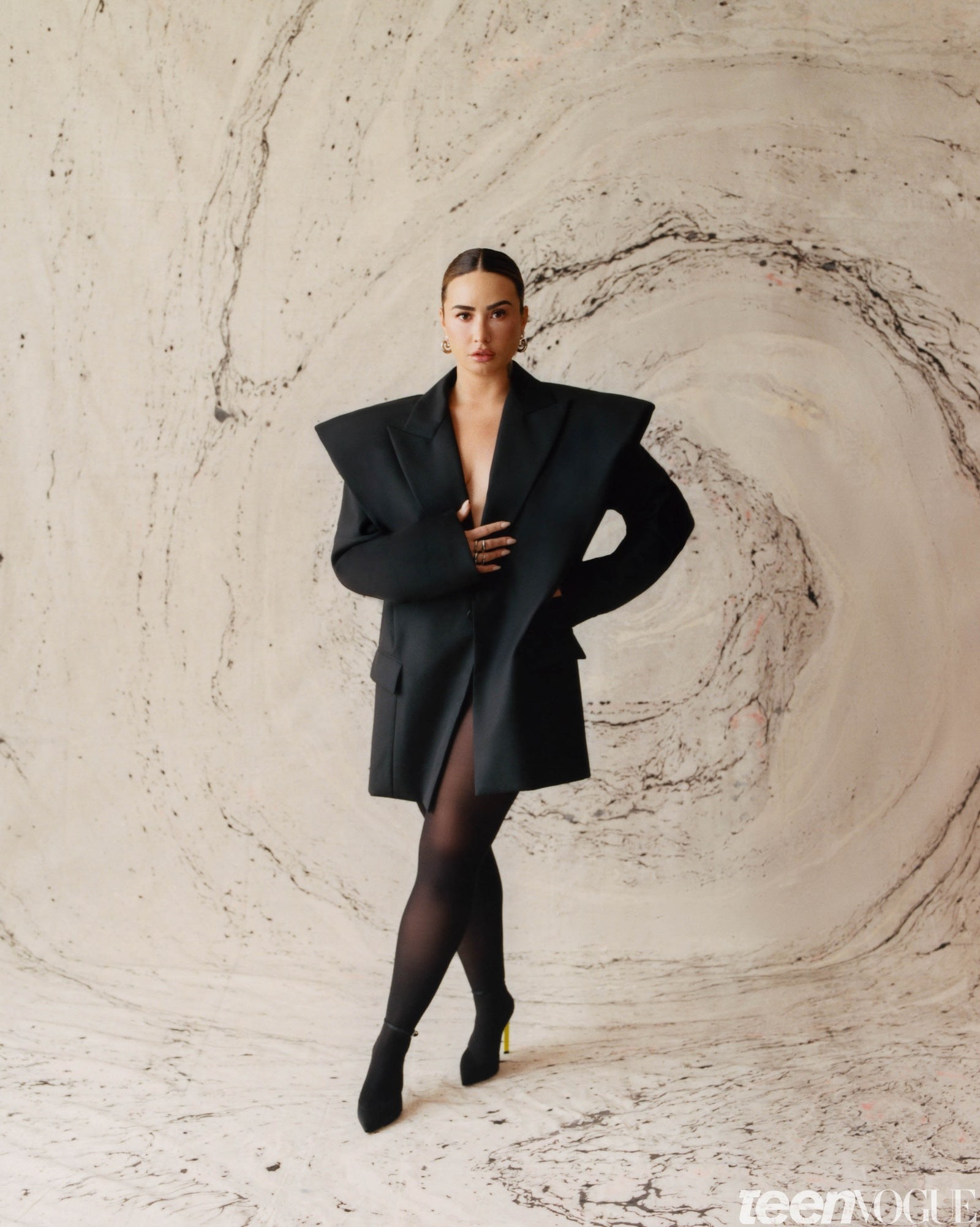
Lovato is now a professional, tying up my loose ends in a way only someone who has spent a lifetime doing interviews like this one can. But, as Lovato notes in the film, it can be difficult to separate professional Demi from just Demi. We’ve watched it all as Demi Lovato has lived it, and they’re still making sense of the fame and fortune and faults that made them. To figure it out, the star is looking back to the beginning, sifting through the grains of their start to understand where they are now.
The beginning is this: Lovato was born in 1992, in Albuquerque, to a former Dallas Cowboys cheerleader mother and a musician-engineer father, who struggled with substance use. She was raised in Dallas, and when she was two years old, her parents divorced. Lovato was then ensconced in a trio that included her mother and older sister, until her mother married her stepfather — whom Lovato considers her father — when she was five. She has happy memories from those years, riding her bike around the neighborhood, playing in the woods near her house.
But there weren’t many years when Lovato wasn’t famous, or at least in the public eye, so her childhood looked different than that of most people, she says. She began “modeling” at age five (she says in her 2017 documentary, Simply Complicated, that these weren’t real jobs, just taking photos), and shortly after that started on the pageant circuit, which is how she developed a love for singing. Lovato’s talent quickly became clear to her and her family, so she started going on auditions. Shirley Temple was her muse — she wanted to be known as a name in both singing and acting, and worked hard to develop those talents. When Lovato was booked on Barney & Friends, in 2002, the role was a breakthrough. She got her first taste of child stardom. So too, then, did she first experience stardom’s negative consequences.
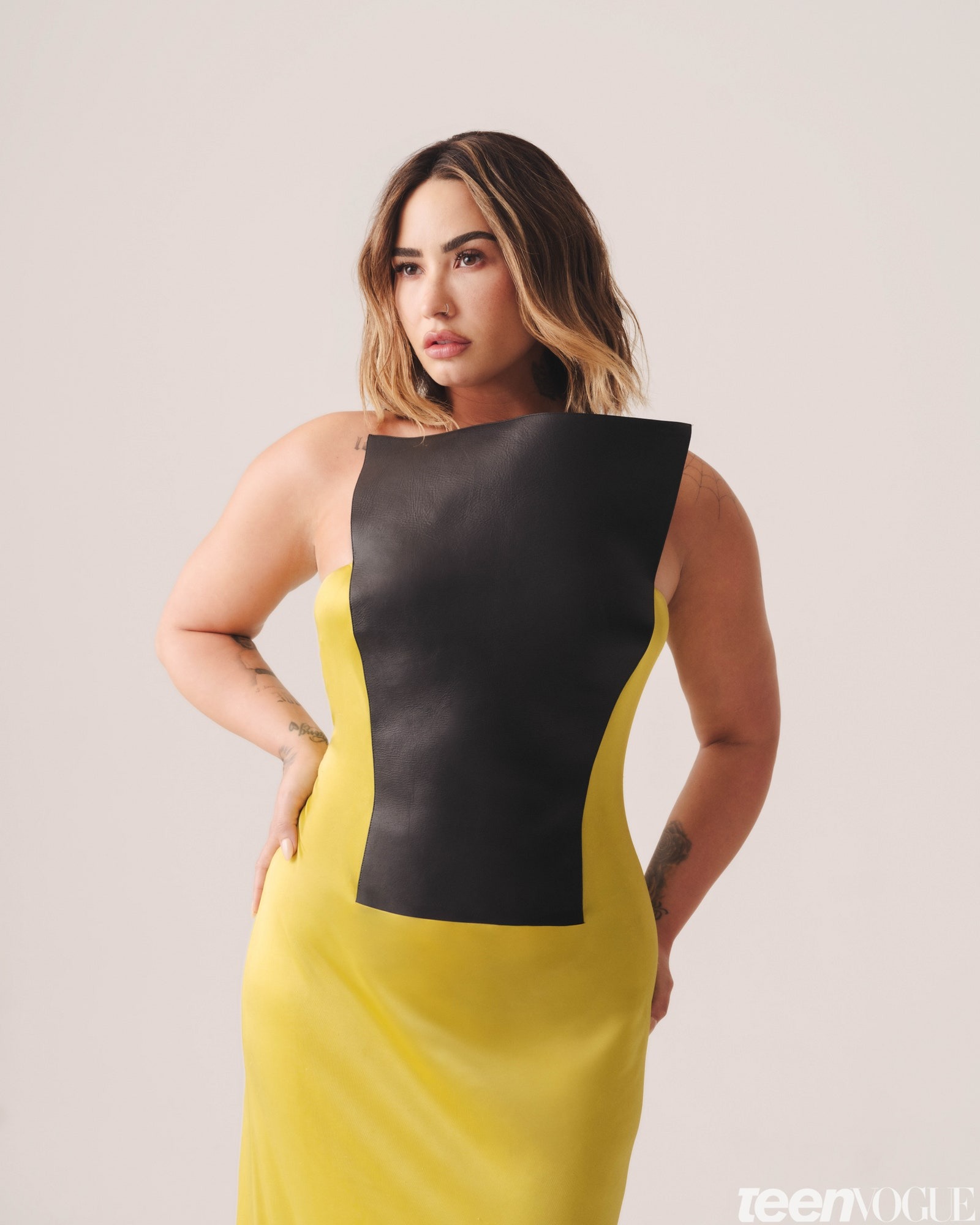
In Child Star, Lovato recounts being bullied because of their burgeoning fame. The bullying got so severe that it culminated in a signed suicide petition from their classmates. Those experiences became fuel for Lovato. “Part of that motivation [in my early career] was like, I’m going to show those bullies. I don’t want them to be able to escape my name,” they say.
That hope was realized when Lovato became a teenager and landed, in quick succession, the roles that made them a household name: as a main character in the Camp Rock films and then the titular character in the Disney show Sonny With a Chance. Lovato and their family left Dallas during this time and moved to LA, a move the star was excited about. “I didn’t feel like I fit in in Dallas,” they recall. “I always thought there was somewhere else I was supposed to be, which I felt was Los Angeles.”
In that new setting, though, Lovato also found a new complication. The fame they had craved wasn’t the salve they thought it might be. “I knew right out the gate that it was a challenging aspect to my life,” they say of their then-fresh fame, keeping a measured tone despite the soul-plundering topic. “It was bittersweet because it was all I wanted, and it was miserable.”
Perhaps this is the story we’re most familiar with: Because of the pressure of fame, Lovato began lashing out and using substances as her mental health deteriorated. In Child Star, Lovato’s Camp Rock costar Allyson Stoner tells her (nervously and with much hesitation) that working with her became difficult. “I do remember a sense of walking on eggshells,” Stoner says. “There definitely was a lot of fear of a blow-up.” Lovato apologizes in the film, wondering aloud how many people she treated poorly back then.
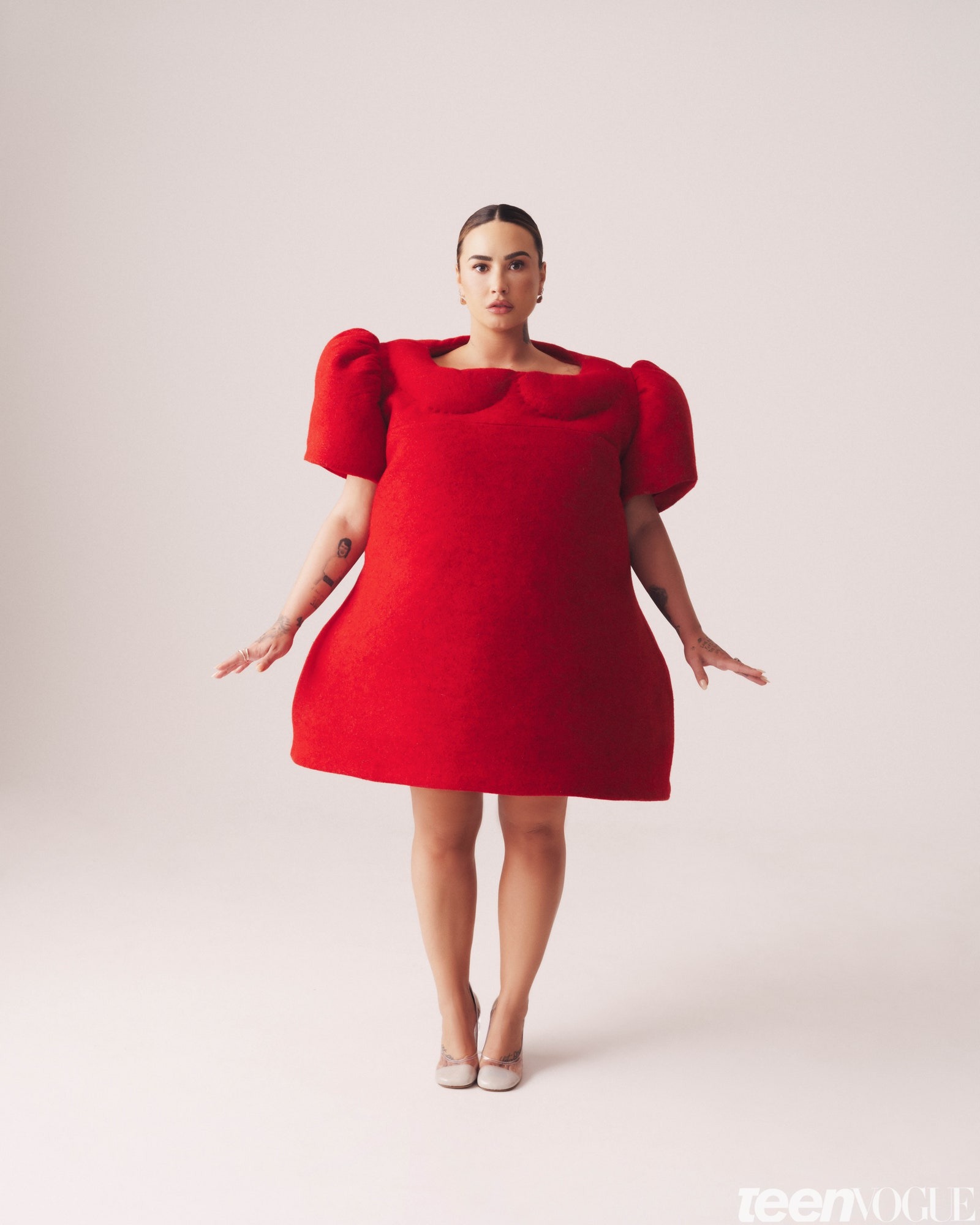
As we sit across from each other, now taking bites of tender steak between questions, I ask Lovato to elaborate on what she was apologizing for. By the time she was filming Camp Rock 2, she says, she was years into a “grueling schedule. I thought, Nobody actually cares. I was isolated. I was lonely. I was essentially miserable, and I treated people poorly because of that.”
One example of that grueling schedule: Lovato’s mother recounts in Child Star a day spent bouncing between interviews and photo shoots before a concert at night. Before she was due to go onstage, Lovato was desperate for a nap, and fell into a sleep so deep that it was difficult for her mother to wake her. The star was being pulled in what seemed like endless different directions, whether by music executives awaiting her next hit album, tour managers stacking concert dates, or movie producers who were writing her starring roles. They ping-ponged from a music tour to filming a television show to a movie role. “Nobody really knew how to stop the machine,” Lovato says in Child Star. “There were never any pauses. I knew that being on Disney Channel, I was in a coveted position, that millions of people would trade me in a heartbeat, and I felt like I was taking it for granted. But really, I was just a teenager who was struggling.”
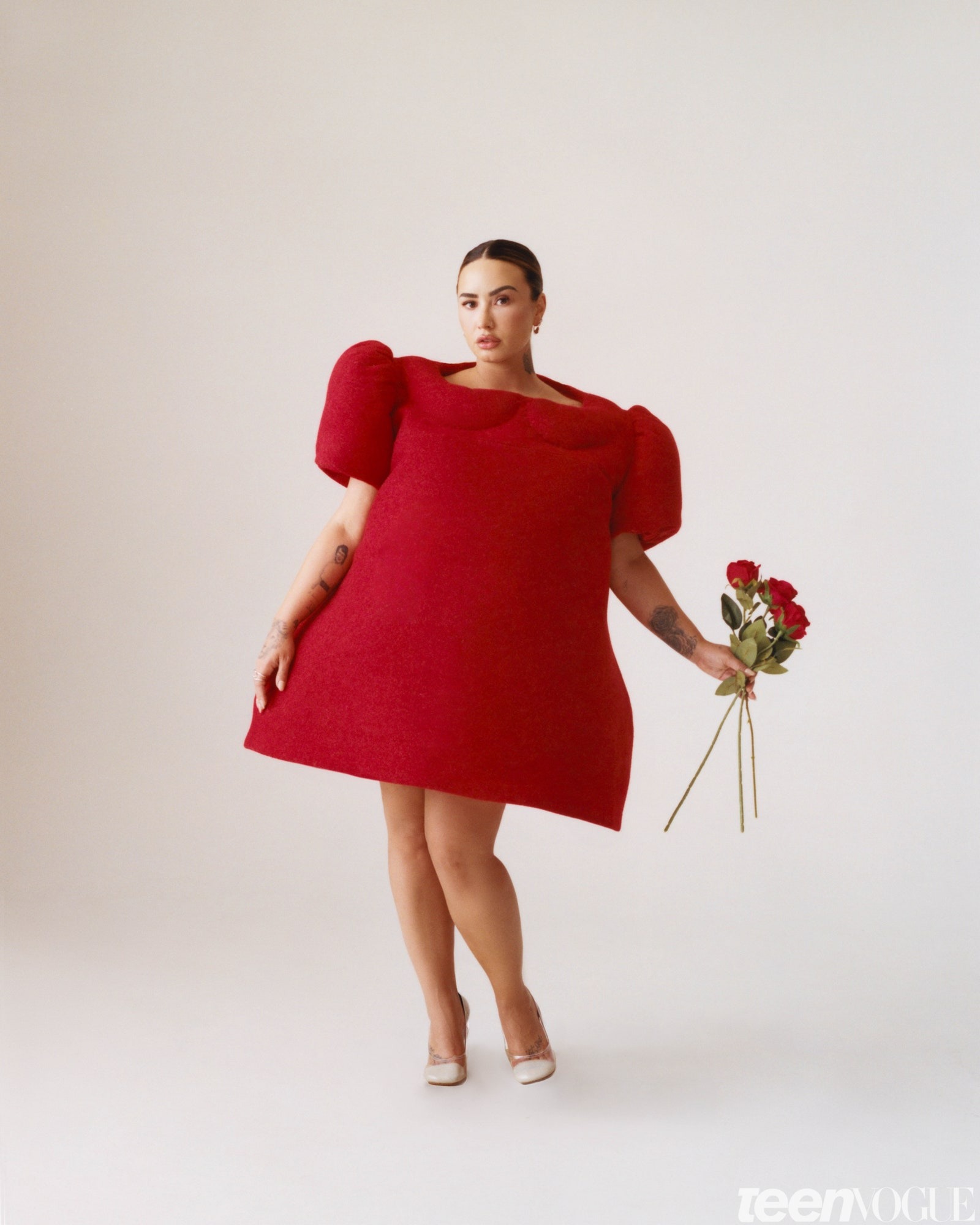
Now we know that at the peak of Lovato’s teen fame, they were using cocaine and other substances, struggling with an eating disorder, and coping with then-undiagnosed bipolar disorder. If you take this at face value, it seems like the impact of child stardom is just devastating. Lovato always wanted to be famous, and when the star found that fame, the pressure of it crushed them for many years of their young life. But, they say, that’s not the full story.
In many ways, landing in the public eye felt like a saving grace, Lovato replies when I ask whether the pressures of fame pushed them toward substance use and an eating disorder they might otherwise have avoided. Lovato calls their career and early fame a catch-22. “Disney channel gave me something to straighten my act for,” they explain. “For the most part, when I went to treatment the first time [at 18 years old], I knew I had to straighten my act up and get the help I needed for my mental health because I wanted to fight for my career.”
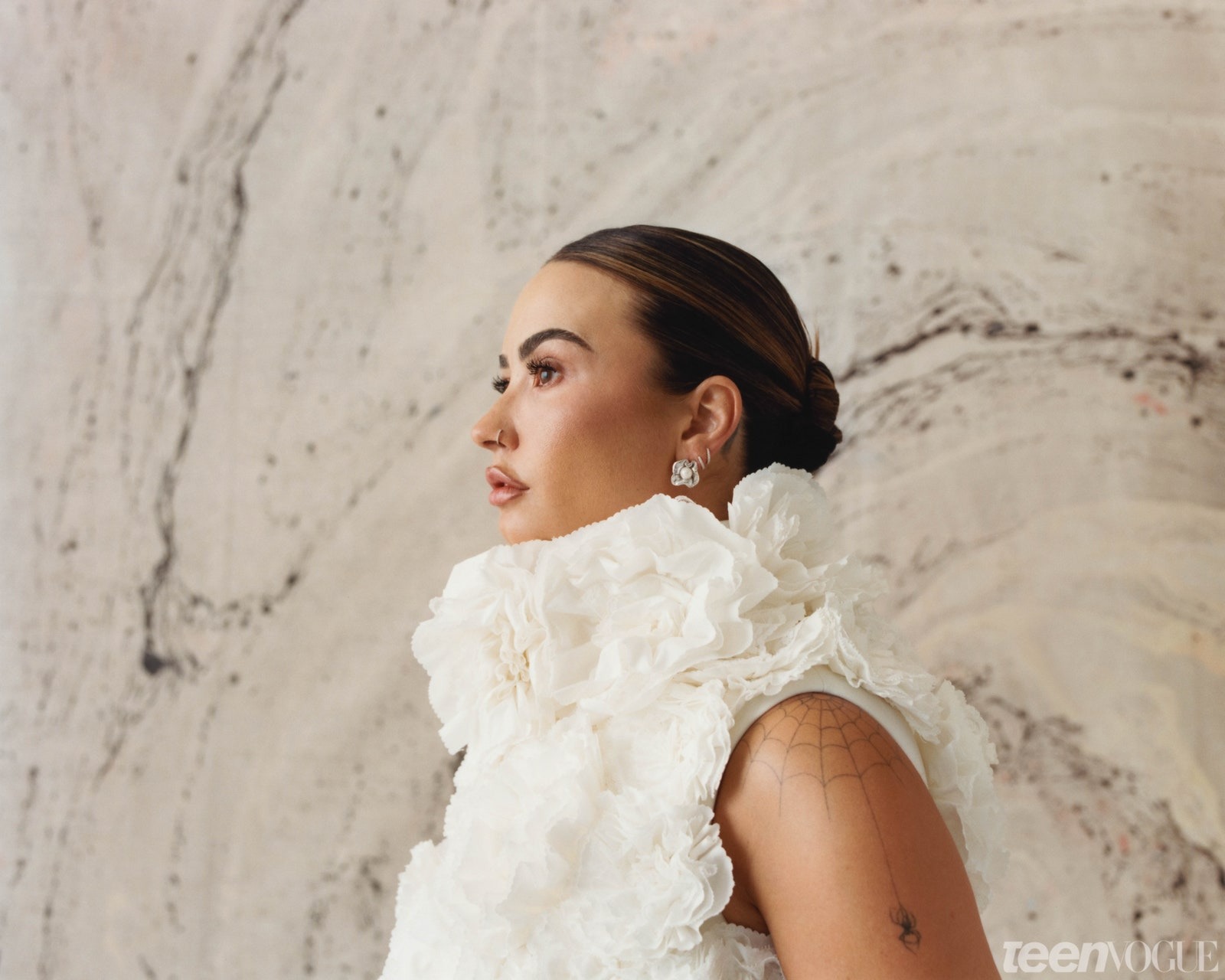
If she hadn’t been Demi Lovato, the teen icon, Lovato says she probably would have stayed in Texas, been very bored, and used substances to self-medicate. Part of that happened anyway, but Lovato has also said that her mental health struggles predate her fame. In Simply Complicated, Lovato says that she first dealt with depression at “a very, very young age.” As early as seven, Lovato says, she was having suicidal ideation, calling herself “fascinated with death.” Finding joy in the entertainment industry then became a positive, as was her motivation to live up to the role Disney had created for her.
“At a certain point I realized everyone on Disney had a brand, and my brand was a role model,” Lovato says. “I had to make decisions in my personal life that were reflective of my brand, or at least if I didn’t make those decisions, I wouldn’t do it publicly.”
So maybe the pressures of being a Disney child star saved Lovato a little, for a little while — until they didn’t. “Eventually,” they say, “substances became a way to self-medicate from the pressure of fame.”

That self-medication, which came in the form of drugs and alcohol, was an attempt to soothe the fracture between what Lovato’s life looked like on the outside — the glamour of fame, professional makeup, and red carpets — and what it felt like on the inside. She recalls a moment in her ascension when she was sitting on her tour bus and crying “for no reason. I was watching my fans chase my tour bus, and I’m sitting in the back just crying, and I couldn’t figure out why. I realized that I was miserable.”
For Lovato, being a commodity made the highs of the job feel hollow, and it created a division between the role-model Demi and the real person. “It felt like a separate self [that fans cheered for], which is why I never fully accepted the validation I was receiving,” she says. “It felt like I had an imposter syndrome situation going on where… because I was placed in this position as this role model, people are only seeing the good sides of me. They don’t see me partying with my friends, blacking out on the weekends. So I knew the whole time that they were cheering for a façade, and it felt empty.”
Says Lovato, when people on set asked how their day was going, they didn’t feel like others really wanted to know; like, they only cared that the star showed up on set as the Demi they were marketing to the public, when the star was actually suffering. But as long as that smiling role model came to work, Lovato felt, those perhaps well-intentioned coworkers were appeased.
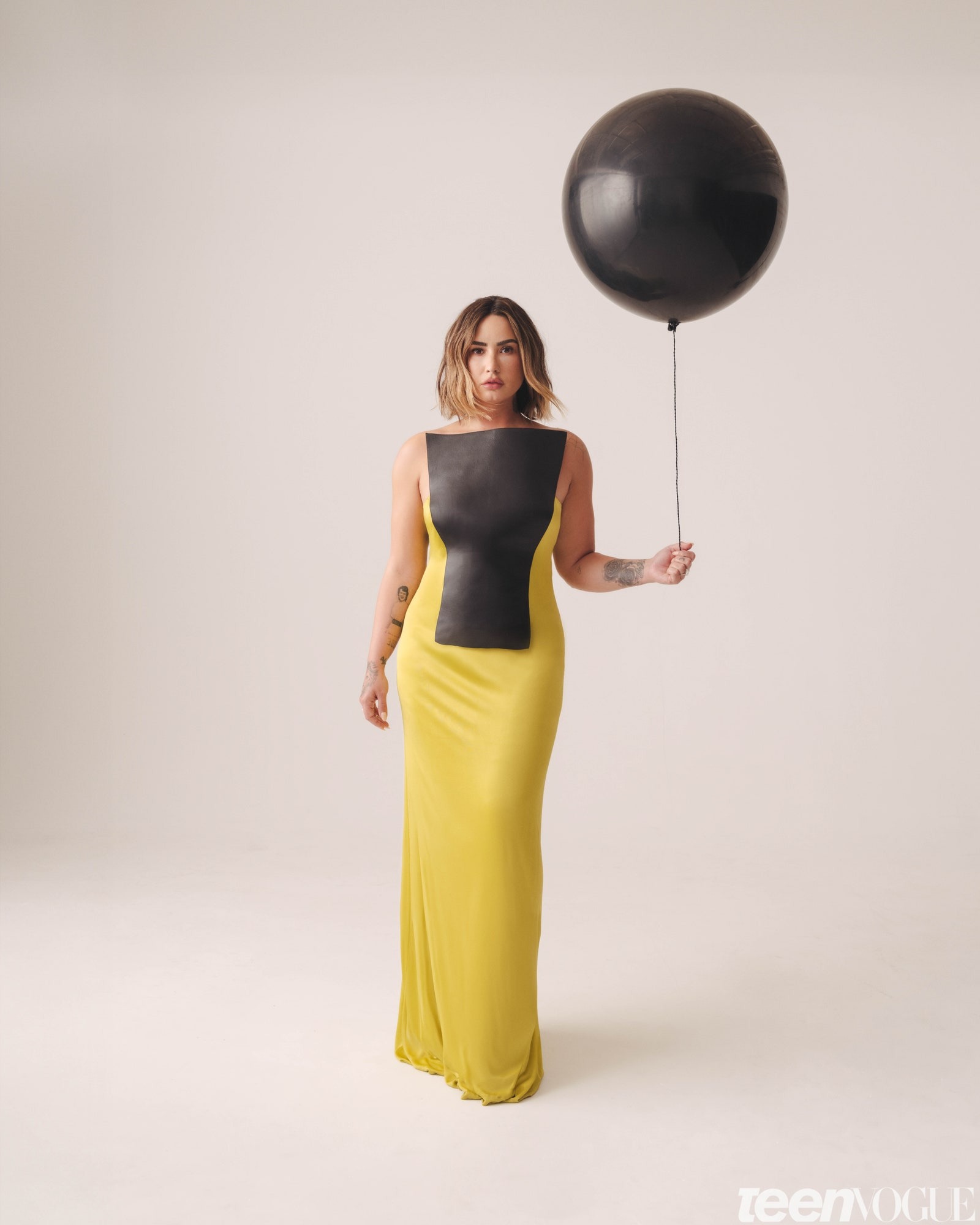
This is really the crux of the documentary, and apparently the crux of what Lovato is coming to terms with: When she was just a kid, still unsure of who she was and who she would become, Lovato became a brand driven by a huge corporation. She had to be polished, professional, and able to put out the content her fans required. But somewhere along the way — and by Lovato’s account, this happened pretty quickly — she lost sight of where the brand ended and where she began. And she’s far from the only former child star who has struggled to figure this out.
It seems there are few things America loves more than the story of a wayward child star and their too-adult rebellion (see: Britney, Macaulay, Lindsay, Justin, Miley, and all the others). The life cycle of such stories is well-trodden: A child star is placed upon a gold-tipped pedestal, and when they topple from a position they never should’ve been placed in, the public is ravenous for details of their fall. Accounts of their exploits are plastered across tabloid covers and hungrily circulated across social media. Despite how golden the golden child was before their rebellion, the entire thing is treated as being almost inevitable. The public isn’t surprised when yet another child star struggles with drug use or an eating disorder or money troubles. It’s almost as if we expect it — and there seems to be a dark, underhanded part in us that relishes the undoing.
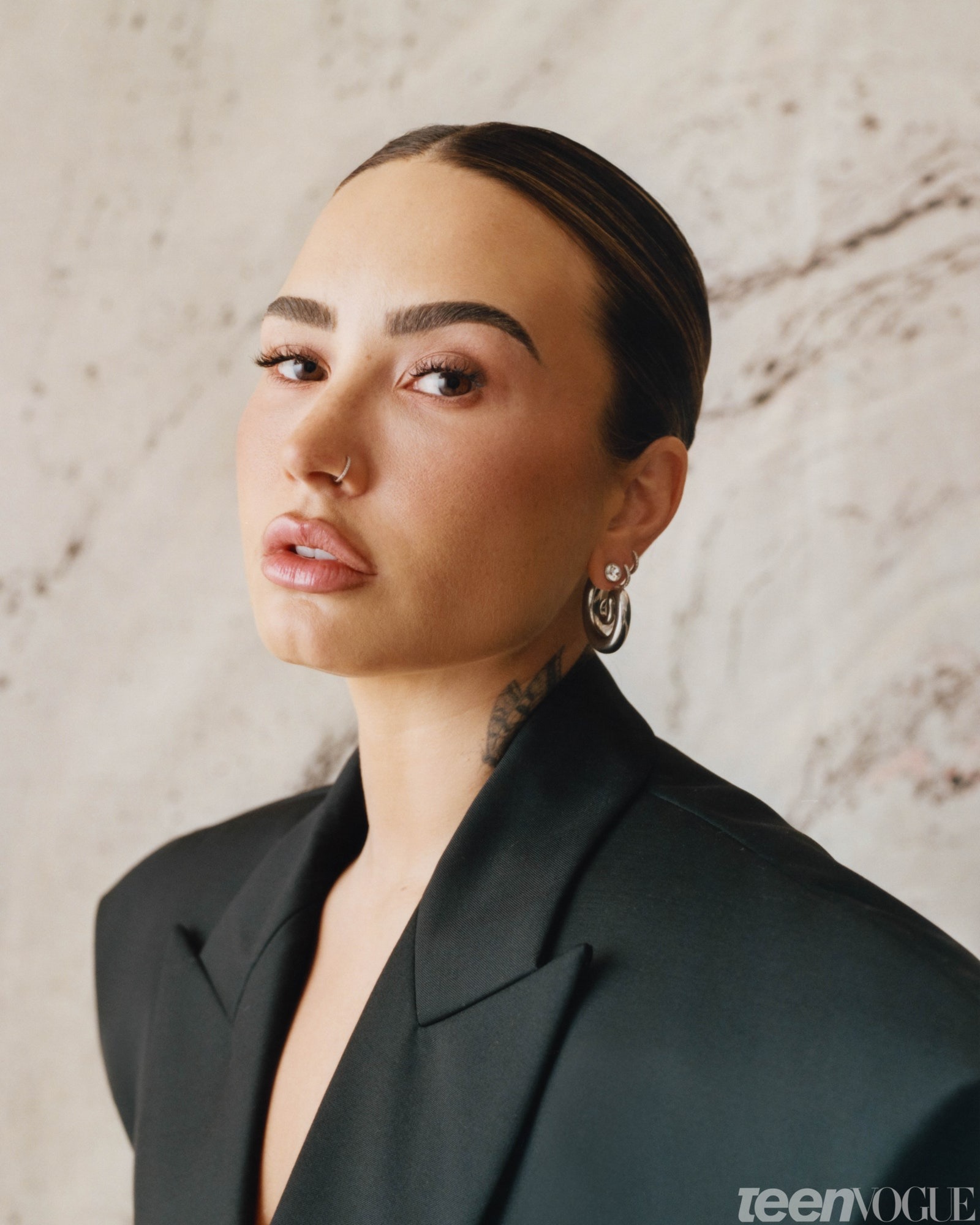
“Anybody that is on top is someone people love to tear down,” Lovato says, noting that they felt immense pressure to live up to expectations as a child star, that they always felt they had something to prove. “There’s a famous saying, ‘There’s nowhere to go from the top but down.’”
But it’s a chicken-or-the-egg scenario. It seems child stars are especially prone to struggling with substance use issues and eating disorders and money troubles, but it’s not always clear where these adverse impacts come from. Is it from the pressure of fame alone? Would these young people have gone down a similar path without fame? Does our fascination with a downfall precipitate the downfall itself?
It’s hard to tell who or what’s at fault here, but in the discussion of what child stardom demands from its participants, sizable blame is placed on stars’ parents who are, at best, seen as unknowing and bumbling or, at worst, calculating stage managers determined to ride their child’s coattails. These things are difficult to parse out, but Lovato is insistent that it was her idea to start auditioning and acting, goals she was pursuing that, for some time, made her happy. But was she old enough that her determination should have counted for so much?
Says Lovato, “I don’t feel like I was old enough to choose it.” But at the same time, performing was what she found joy in, and she begged her parents to allow her to pursue it. As a child, she says, she never played sports. She tried gymnastics and cheerleading, but they didn’t spark joy — at least not the same way that being creative and performing did. What were her parents supposed to do, Lovato wonders, when they saw that the thing she was begging for was also what brought her genuine happiness? And how were they to know it would be the same thing to also bring genuine misery?
Looking back, I wonder, trying to phrase my question carefully, does Lovato blame her parents? Her answer is equally careful: “I don’t want to place the blame on anyone. But at the same time, there was a responsibility to protect us.” Lovato also points out that blame and responsibility are two separate things. “And the problem is, once you get into the industry, the train doesn’t stop going unless you slam on the brakes.”
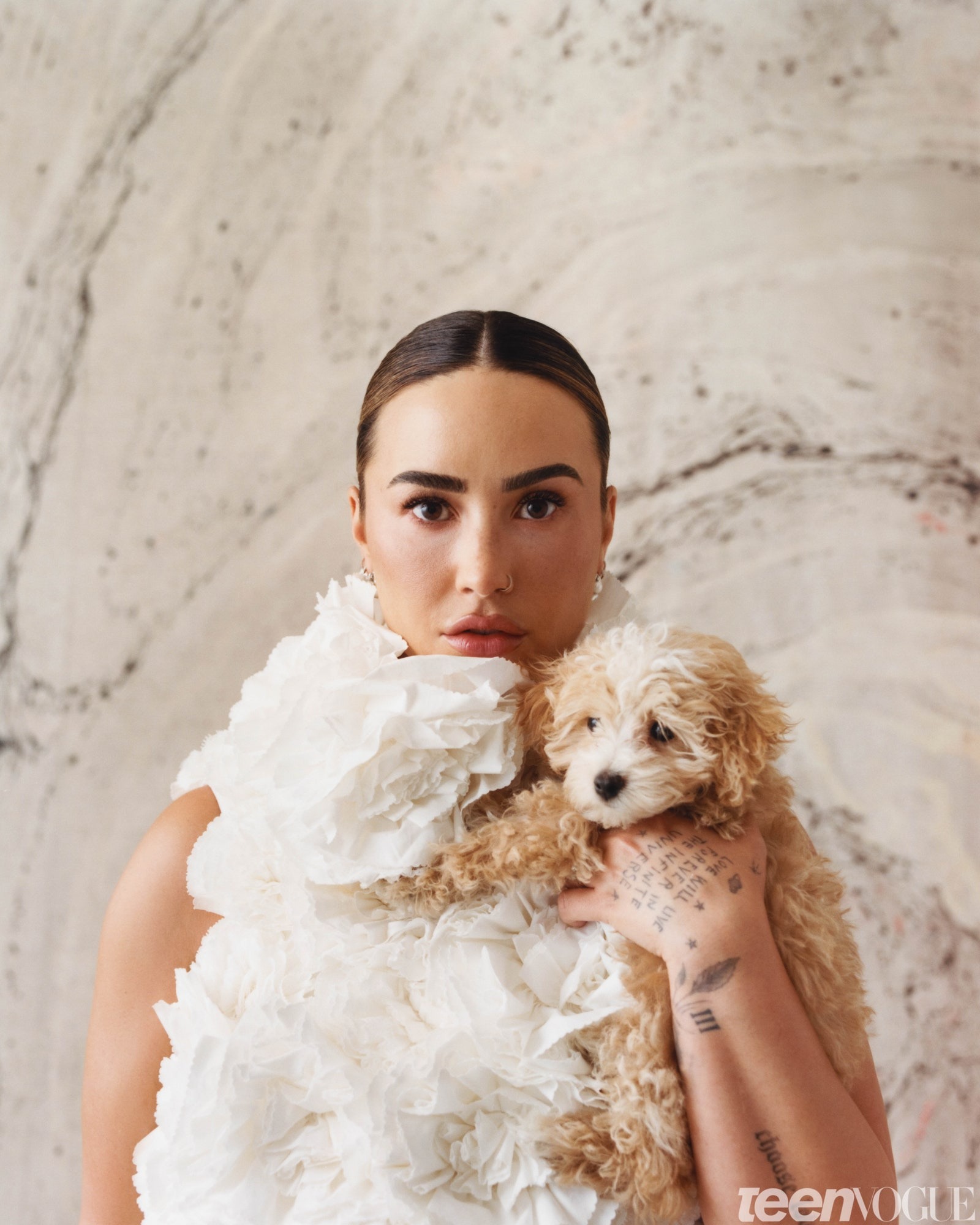
Lovato strikes me as someone who was never going to slam on the brakes willingly, which is why it’s difficult to reconcile these feelings. Their parents always told them they could quit at any time, the star says, and remembers their mom did try to pump the brakes. “My mom said to me one time, ‘I think you need to get help,’” Lovato says. “I told her, ‘I’m not ready. I don’t want to lose the momentum of my career.’” And that’s the thing: Lovato never wanted to lose that momentum, even when they were miserable, even when their career was the source of that misery. “There was never really a point in my life where I thought, I don’t want to do this anymore.”
Lovato addresses this paradox in their forthcoming song, “You’ll Be OK, Kid”: “One day you’ll blink, it’s all gonna happen but not how you think,” they sing slowly on the track. “Can’t stop you, don’t want to,” the song continues, before apparently describing how the perils of the industry shaped them into the strong person they are today.
Even if Lovato or their parents were unable or unwilling to hit the brakes, they say, there were people who saw them suffering with an eating disorder and substance use, people who maybe could have and maybe should have tried to protect them from the negative impacts of fame. “I know for a fact some people knew I was struggling,” Lovato says. “Some people wanted to protect me and some people just wanted the train to keep moving. And that was hard to grasp.”
In many ways, over the last few years, Lovato has taken back control of her narrative — of her life.
As our outing suggests, she’s getting more into cooking, which has been a way to sort through her eating disorder and food issues. Cooking is Lovato’s way of “[seeing] food as a tool rather than an enemy.” Cooking and baking are methods for tapping into her rebellious nature, she tells me with a laugh: “[Cooking] is rebelling against [the eating disorder]. It’s one aspect of rebellion in my life that hasn’t gotten me into trouble.”
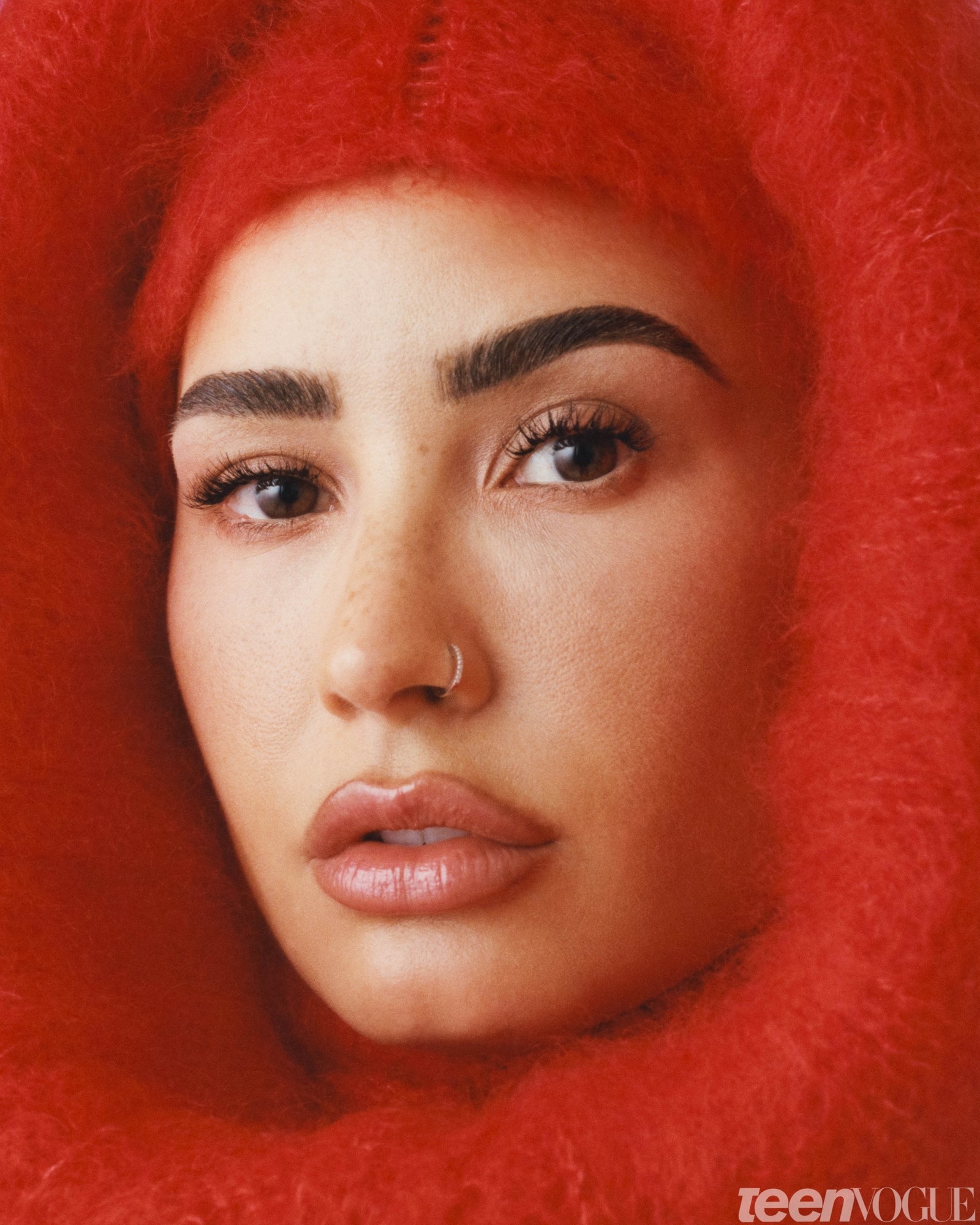
Before our lesson from Chef Stone, Lovato says, she’d never cooked steak before. But today we cooked four of them — so much steak that Lovato also shares our meal with her crew. This is a far cry, she says, from when her eating disorder was in full swing. “I was on an outing at an eating disorder treatment facility, and one of the exercises was for us to go to a grocery store and get ingredients for a recipe,” she remembers. “I just started crying. I was so overwhelmed [in the store]. But then fast-forward to now, it’s been quite some time since that day — I just had to learn how to take that lead.”
Watching Child Star is watching Lovato embark on a quest to take the lead in figuring out how child stardom changed their life and the lives of other children ensnared in its grasp. Every conversation seems to have the same heartbeat: “Did this also happen to you? Is it normal how much this changed me?” And also: “What do I do now?” Lovato’s new film is both an answer to these questions and a question in itself.

“While [Child Star is] a cautionary tale to some degree, it’s also a form of self-exploration,” Lovato says. “Would things have turned out differently had I not been in the public eye? I don’t know. And that’s what I’m still learning.”
She hopes people will have a better understanding of the pressures and issues facing child actors after watching the film. She also wants to see more legislation passed to protect child social media influencers, who are largely unprotected under current laws and have even fewer safeguards than child actors working in the traditional film and television industry.
Lovato’s relationship with fame may still be in question, but there’s another relationship that feels much more secure for her. The star brightens when she tells me about her engagement to Jordan Lutes (who, she says, loves the brownies she bakes him from scratch). The pair reportedly met in 2022, when they cowrote a song, and Lovato “instantly had a crush” on Lutes. Now they’re busy planning their wedding, which Lovato says will take place in 2025. She’s the kind of person who has been dreaming of her wedding day since she was young, and she’s determined to make it perfect. “I live and breathe for our connection,” Lovato says of Lutes, as a bespoke pear-shaped engagement ring twinkles from her tattooed hand. “Everything I do, I wish was with him. I see my future with him. I see growing old with him.”
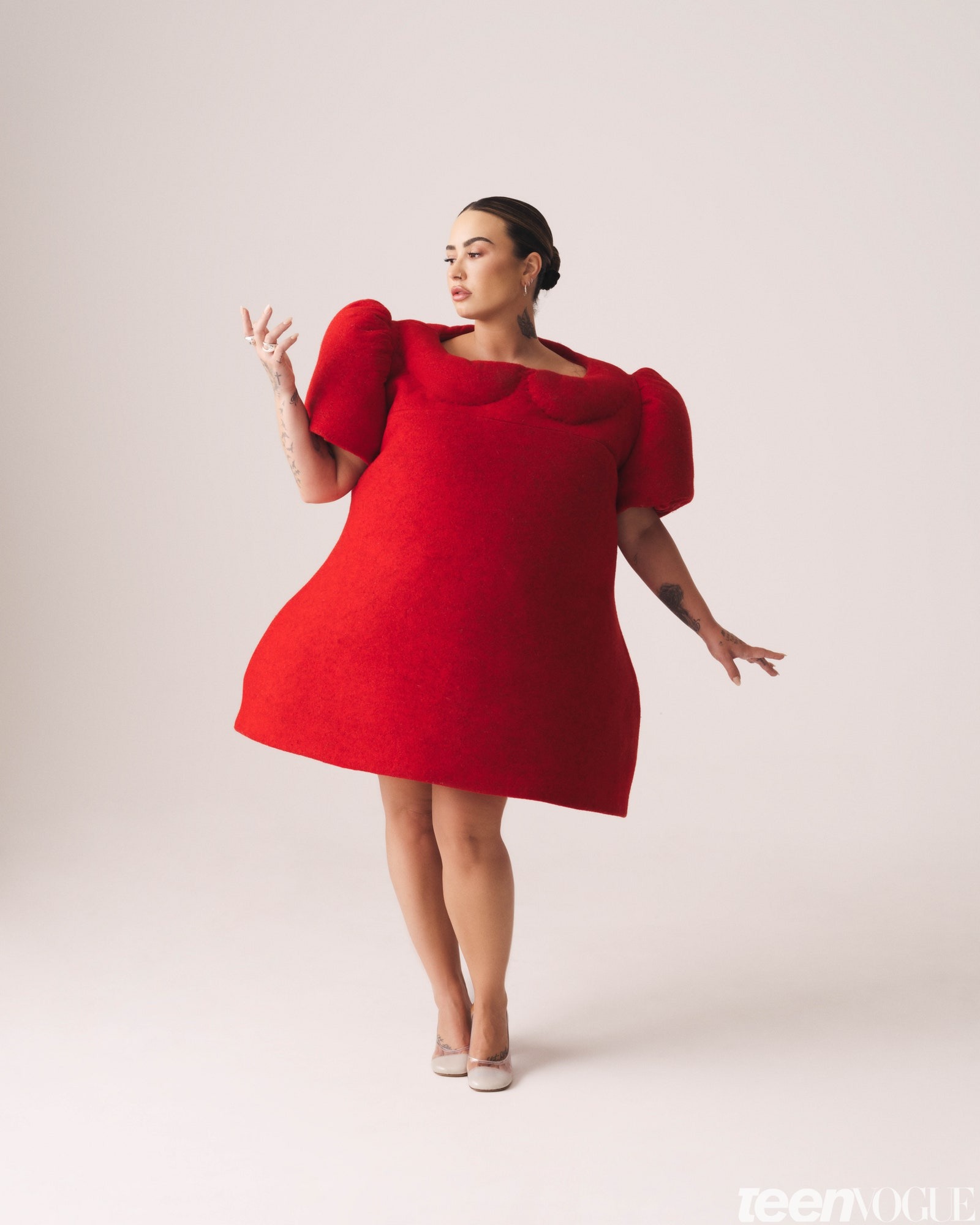
Lovato also envisions having children with their soon-to-be-husband. Though the star does want to wait a while — “I’m not ready to give up my alone time with [Jordan]” — they already have firm boundaries regarding images of their future children. “I don’t even want to share their faces in pictures on Instagram when they’re born,” Lovato says. “I want them to have that anonymity.”
The choice reflects a larger trend toward privacy among even non-celebrity parents, but what is it for Lovato that makes her uneasy about sharing pictures of her children? “I share a lot with the world and I just want some things to be mine,” she explains, pausing before adding, “Yeah, I’ve given a lot.”
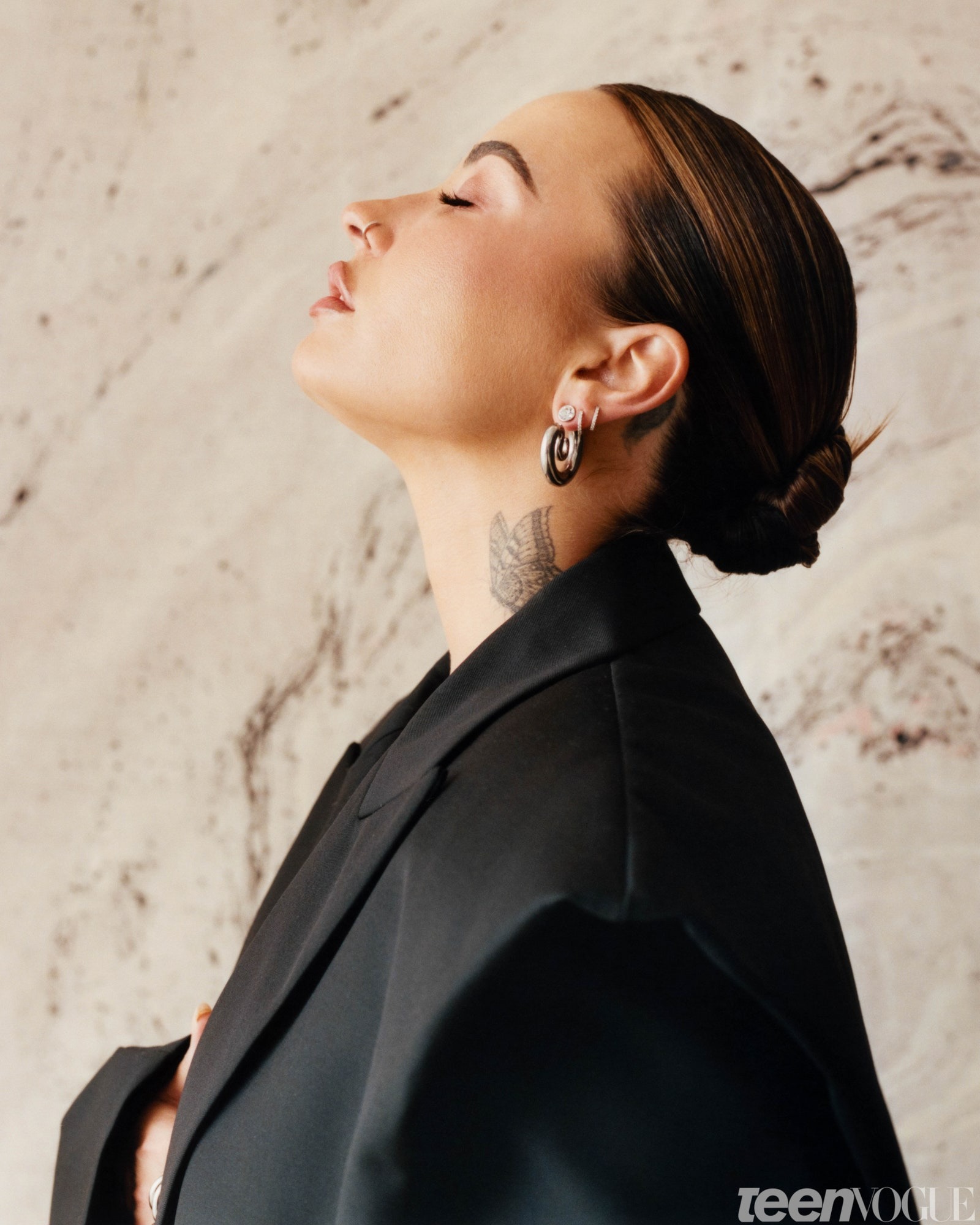
As Lovato maps out her future, she says, reflecting on all that she’s given has been crucial to moving forward. Because yes, she’s decrying child fame and hoping the system changes, and she wouldn’t want such fame for her own children, but she also aims to remain relevant in the industry, keeps producing work, and still benefits from the childhood fame she scrutinizes in her film.
“I oftentimes think about what I want to do with my future, and I don’t know what that looks like yet,” says Lovato. “But I felt like I had to go back to the beginning to figure that out: Why I got into the industry; what was it about it that made me want to do this particular job; what I love about it; and what did I fight for when I thought it was getting stripped away? I have to go back to the beginning in order to figure out what future I want for myself.”